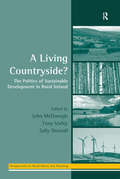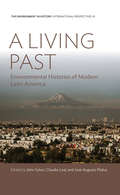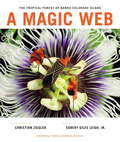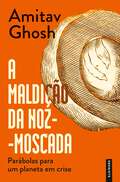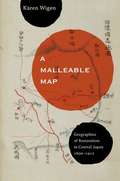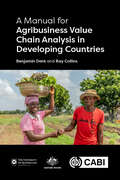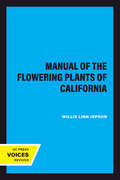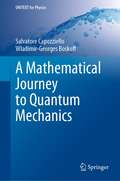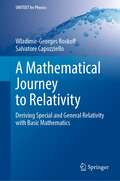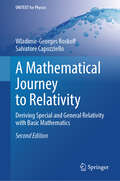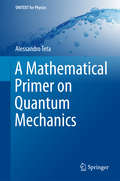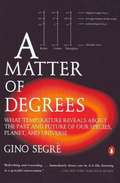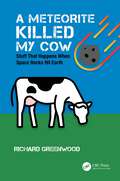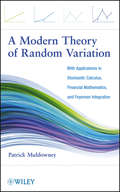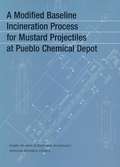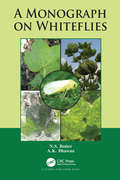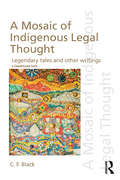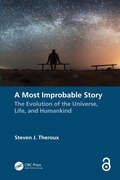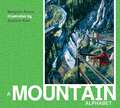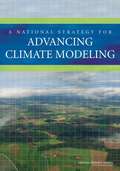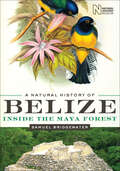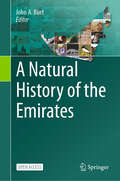- Table View
- List View
A Living Countryside?: The Politics of Sustainable Development in Rural Ireland (Perspectives on Rural Policy and Planning)
by Tony VarleyBy examining a range of experiences from both the north and south of Ireland, this book asks what the ideal of sustainable development might mean to specific rural groups and how sustainable development goals have been pursued across the policy spectrum. It assesses the extent of commitment to a living countryside in Ireland and compares various opportunities and obstacles to the actual achievement of sustainable rural development. How different sectors of rural society will be challenged in terms of future survival provides an overarching theme throughout.
A Living Past: Environmental Histories of Modern Latin America (Environment in History: International Perspectives #13)
by José Augusto Pádua John Soluri, Claudia LealThough still a relatively young field, the study of Latin American environmental history is blossoming, as the contributions to this definitive volume demonstrate. Bringing together thirteen leading experts on the region, A Living Past synthesizes a wide range of scholarship to offer new perspectives on environmental change in Latin America and the Spanish Caribbean since the nineteenth century. Each chapter provides insightful, up-to-date syntheses of current scholarship on critical countries and ecosystems (including Brazil, Mexico, the Caribbean, the tropical Andes, and tropical forests) and such cross-cutting themes as agriculture, conservation, mining, ranching, science, and urbanization. Together, these studies provide valuable historical contexts for making sense of contemporary environmental challenges facing the region.
A Llama Is Not an Alpaca: And Other Mistaken Animal Identities
by Karen JamesonCombining scientific facts with the art of poetry, this is a humorous and educational picture book about animals that look alike. How do you tell a llama from an alpaca, an alligator from a crocodile, or a dolphin from a porpoise? The animal kingdom is full of creatures that look so similar to others that they are often confused for each other. A Llama Is Not an Alpaca pairs rhyming animal riddles with factual responses to both teach and engage young readers as they compare and contrast features of commonly misidentified animals. How many will you get right?!
A Log's Life
by Wendy PfefferOne stormy day a strong wind rages through the forest, causing an old oak tree to bend and sway. Lightning strikes; the tree crashes to the ground. Now it's a giant log.
A Love Letter To The Planet
by Thich Nhat HanhA passionate appeal for ecological mindfulness and strengthening our relationship to the Earth. Based on the best selling The World We Have.
A Magic Web
by Christian Ziegler Egbert Giles LeighThe tropical forest of Panama's Barro Colorado Island is a luxuriant community of plants and animals, pulsating with life and offering an astonishing view of nature's myriad processes. What does the forest look like? How do the activities of the forest's plants and animals create a community?In A Magic Web, photographer Christian Ziegler and evolutionary biologist Egbert Giles Leigh, Jr., invite readers to enter the marvelous world of Barro Colorado Island. This book is a unique combination of spectacular photography and clear, authoritative text written by an active scientist who has spent half a lifetime trying to understand the tropical forest. Luscious photographs of the forest reveal the wonderful diversity of its inhabitants and show many of the activities that give it its character and lend structure to its community. Drawing on decades of work on Barro Colorado Island, Egbert Leigh explains how the forest works: how plants and animals compete with but also depend on each other; how the solitary lives of cats contrast with the intricately organized lives of armies of ants; the variety of ways plants struggle for a place in the sun; and how these plants attract animals to pollenate their flowers. Finally, the book shows the importance of tropical forests to the people living near them, why they matter to the world at large, what we can learn from them, and how they differ from temperate-zone forests.Full of stunning full-color photographs accompanied by clear and accessible text, A Magic Web is a must for anyone planning to visit a tropical forest and for all those who wish they could.
A Maldição da Noz-Moscada: Parábolas para um Planeta em Crise
by AMITAV GHOSHUm livro polémico, uma crítica à cosmovisão do Ocidente por um dos mais conceituados romancistas da atualidade. Decorria o ano de 1621. A simples queda de um objeto, uma candeia, é o pretexto para o comandante das tropas holandesas aquarteladas numa das ilhas Banda, no território das Molucas, dar início ao massacre de toda a população local. Poucos habitantes sobreviveriam, e a sua língua e cultura perder-se-iam para sempre. A eliminação do povo Banda é um dos grandes genocídios esquecidos pela História. O motivo: o controlo por parte da Venerável Companhia das Índias Orientais do rentável comércio milenar da noz-moscada, uma especiaria muito apreciada na Europa pelos seus usos culinários e medicinais, de preço exorbitante, e cuja inteira produção mundial estava circunscrita até então a esse pequeno arquipélago do Índico. Em pleno século XXI, Amitav Ghosh, com mão de romancista, traz à luz este episódio negro, que serve de ponto de partida para relacionar o passado com o presente, o colonialismo com a atual crise climática, e explicar o mundo em que vivemos: da crise dos refugiados ao movimento Black Lives Matter, às cidades modernas ou mesmo às naturezas-mortas do período áureo da pintura holandesa. «Não deixem de ler este livro.» Naomi Klein «Urgente, maravilhoso e ambicioso… um livro de leitura obrigatória.» Times Literary Supplement «Ghosh recorre à literatura de viagens, à narrativa pessoal, à análise histórica e àsíntese de um vasto conhecimento académico para contar a história do nosso império ocidental e do extermínio do nosso mundo.» Los Angeles Review of Books «A Maldição da Noz-Moscada é, ao mesmo tempo, uma biografia não autorizada desta especiaria e um apelo a novas políticas que respeitem a ação ou “vitalidade” dos seres não humanos que nos rodeiam.»The White Review «Esclarecedor... Ghosh faz-nos pensar nas estruturas globais de poder que envolvem a subjugação física de povos e de territórios e, sobretudo, na ideia de conquista como um processo de extração.» The New Yorker«Um feito notável e um título atual, A Maldição da Noz-Moscada recorda-nos a razão pela qual a terra está a chorar.» Booklist «Ghosh escreveu uma obra que atinge o nosso cérebro e o nosso coração com uma clareza moral e analítica inesquecível.» Bloomberg
A Malleable Map: Geographies of Restoration in Central Japan, 1600-1912
by Karen WigenDrawing on a wide range of geographical documents from Shinano, Wigen argues that both the founder of the Tokugawa Shogunate (1600-1868) and the reformers of the Meiji era (1868-1912) recruited the classical map to serve the cause of administrative reform.
A Manual for Agribusiness Value Chain Analysis in Developing Countries
by Dr Benjamin Dent Professor Ray CollinsValue Chain Analysis (VCA) diagnoses the current state of a value chain and makes recommendations to improve its effectiveness and efficiency. Applying VCA in developing countries is very often subject to limited time and funding. This manual shows how VCA principles can be applied under such circumstances. It explains how to undertake an affordable VCA that still generates valid data and so produces recommendations that will have impact. The manual has four parts: Part 1: Our Approach to Value Chain Thinking - sets out the principles and practice of taking a value chain approach. Part 2: Conducting Value Chain Analysis - covers planning a VCA, conducting consumer research, interviewing, analysing, creating recommendations and reporting. Part 3: Case Studies - illustrates successful VCAs with case studies e.g. Ghanaian pineapples and Kenyan indigenous chicken. Part 4: Further Reading and Biographies The practical style and content will make this manual accessible to a wide audience: NGO practitioners; government policymakers and extension officers; private sector managers and consultants; and academics for teaching and researching.
A Manual of the Flowering Plants of California
by Willis Linn JepsonThis title is part of UC Press's Voices Revived program, which commemorates University of California Press’s mission to seek out and cultivate the brightest minds and give them voice, reach, and impact. Drawing on a backlist dating to 1893, Voices Revived makes high-quality, peer-reviewed scholarship accessible once again using print-on-demand technology. This title was originally published in 1925.
A Mathematical Journey to Quantum Mechanics (UNITEXT for Physics)
by Wladimir-Georges Boskoff Salvatore CapozzielloThis book provides an itinerary to quantum mechanics taking into account the basic mathematics to formulate it. Specifically, it features the main experiments and postulates of quantum mechanics pointing out their mathematical prominent aspects showing how physical concepts and mathematical tools are deeply intertwined. The material covers topics such as analytic mechanics in Newtonian, Lagrangian, and Hamiltonian formulations, theory of light as formulated in special relativity, and then why quantum mechanics is necessary to explain experiments like the double-split, atomic spectra, and photoelectric effect. The Schrödinger equation and its solutions are developed in detail. It is pointed out that, starting from the concept of the harmonic oscillator, it is possible to develop advanced quantum mechanics. Furthermore, the mathematics behind the Heisenberg uncertainty principle is constructed towards advanced quantum mechanical principles. Relativistic quantum mechanics is finally considered.The book is devoted to undergraduate students from University courses of Physics, Mathematics, Chemistry, and Engineering. It consists of 50 self-contained lectures, and any statement and theorem are demonstrated in detail. It is the companion book of "A Mathematical Journey to Relativity", by the same Authors, published by Springer in 2020.
A Mathematical Journey to Relativity: Deriving Special and General Relativity with Basic Mathematics (UNITEXT for Physics)
by Wladimir-Georges Boskoff Salvatore CapozzielloThis book opens with an axiomatic description of Euclidean and non-Euclidean geometries. Euclidean geometry is the starting point to understand all other geometries and it is the cornerstone for our basic intuition of vector spaces. The generalization to non-Euclidean geometry is the following step to develop the language of Special and General Relativity. These theories are discussed starting from a full geometric point of view. Differential geometry is presented in the simplest way and it is applied to describe the physical world. The final result of this construction is deriving the Einstein field equations for gravitation and spacetime dynamics. Possible solutions, and their physical implications are also discussed: the Schwarzschild metric, the relativistic trajectory of planets, the deflection of light, the black holes, the cosmological solutions like de Sitter, Friedmann-Lemaître-Robertson-Walker, and Gödel ones. Some current problems like dark energy are also scketched. The book is self-contained and includes details of all proofs. It provides solutions or tips to solve problems and exercises. It is designed for undergraduate students and for all readers who want a first geometric approach to Special and General Relativity.
A Mathematical Journey to Relativity: Deriving Special and General Relativity with Basic Mathematics (UNITEXT for Physics)
by Wladimir-Georges Boskoff Salvatore CapozzielloThe 2nd edition of this textbook features more than 100 pages of new material, including four new chapters, as well as an improved discussion of differential geometry concepts and their applications. The textbook aims to provide a comprehensive geometric description of Special and General Relativity, starting from basic Euclidean geometry to more advanced non-Euclidean geometry and differential geometry. Readers will learn about the Schwarzschild metric, the relativistic trajectory of planets, the deflection of light, the black holes, and the cosmological solutions like de Sitter, Friedman-Lemaître-Robertson-Walker, and Gödel ones, as well as the implications of each of them for the observed physical world. In addition, the book provides step-by-step solutions to problems and exercises, making it an ideal introduction for undergraduate students and readers looking to gain a better understanding of Special and General Relativity. In this new edition, a wide discussion on metric-affine theories of gravity and equivalent formulations of General Relativity is reported. The aim is presenting also topics which could be useful for PhD students and researchers studying General Relativity from an advanced point of view.
A Mathematical Primer on Quantum Mechanics (UNITEXT for Physics)
by Alessandro TetaThis book offers a rigorous yet elementary approach to quantum mechanics that will meet the needs of Master’s-level Mathematics students and is equally suitable for Physics students who are interested in gaining a deeper understanding of the mathematical structure of the theory. Throughout the coverage, which is limited to single-particle quantum mechanics, the focus is on formulating theory and developing applications in a mathematically precise manner. Following a review of selected key concepts in classical physics and the historical background, the basic elements of the theory of operators in Hilbert spaces are presented and used to formulate the rules of quantum mechanics. The discussion then turns to free particles, harmonic oscillators, delta potential, and hydrogen atoms, providing rigorous proofs of the corresponding dynamical properties. Starting from an analysis of these applications, readers are subsequently introduced to more advanced topics such as the classical limit, scattering theory, and spectral analysis of Schrödinger operators. The main content is complemented by numerous exercises that stimulate interactive learning and help readers check their progress.
A Matter of Degrees
by Gino SegreIn a wonderful synthesis of science, history, and imagination, Gino Segrè, an internationally renowned theoretical physicist, embarks on a wide-ranging exploration of how the fundamental scientific concept of temperature is bound up with the very essence of both life and matter. Why is the internal temperature of most mammals fixed near 98.6°? How do geologists use temperature to track the history of our planet? Why is the quest for absolute zero and its quantum mechanical significance the key to understanding superconductivity? And what can we learn from neutrinos, the subatomic "messages from the sun" that may hold the key to understanding the birth-and death-of our solar system? In answering these and hundreds of other temperature-sensitive questions, Segrè presents an uncanny view of the world around us.
A Meteorite Killed My Cow: Stuff That Happens When Space Rocks Hit Earth
by Richard GreenwoodMeteorites are generally considered to be bizarre and exotic space junk that you only ever come across in museums. But the reality is very different. Meteorites are generally harmless, with the exception of a cow in Venezuela and a few dinosaurs. Well, quite a few dinosaurs in fact! They are arriving on Earth every day, everywhere, in the form of fine dust. The result is that meteorites can be collected from the rooftops of houses everywhere. It’s not easy and you need to know what to look for. This book will help. Meteorites are the oldest rocks in our Solar System and contain grains that are even older. These space rocks provide science with the best available evidence concerning the origin and early evolution of the Solar System.This book introduces the reader to the fascinating and sometimes bizarre world of space rocks using a simple, clear layman-friendly style. It explains why they are so special and describes their main characteristics. The non-technical approach used throughout the book make it particularly accessible to the general public and it will be of interest to anyone looking to learn more about these cosmic visitors and the wealth of scientific information they contain.Features: Provides a concise introduction to the world of meteorites in an accessible and non-technical way Demonstrates how meteorites can be found locally and provides practical guidance on how to search for them! Emphasizes the human side of meteorites and how ordinary people can and do encounter meteorites in a wide variety of settings
A Modern Theory of Random Variation
by Patrick MuldowneyA ground-breaking and practical treatment of probability and stochastic processes A Modern Theory of Random Variation is a new and radical re-formulation of the mathematical underpinnings of subjects as diverse as investment, communication engineering, and quantum mechanics. Setting aside the classical theory of probability measure spaces, the book utilizes a mathematically rigorous version of the theory of random variation that bases itself exclusively on finitely additive probability distribution functions. In place of twentieth century Lebesgue integration and measure theory, the author uses the simpler concept of Riemann sums, and the non-absolute Riemann-type integration of Henstock. Readers are supplied with an accessible approach to standard elements of probability theory such as the central limmit theorem and Brownian motion as well as remarkable, new results on Feynman diagrams and stochastic integrals. Throughout the book, detailed numerical demonstrations accompany the discussions of abstract mathematical theory, from the simplest elements of the subject to the most complex. In addition, an array of numerical examples and vivid illustrations showcase how the presented methods and applications can be undertaken at various levels of complexity. A Modern Theory of Random Variation is a suitable book for courses on mathematical analysis, probability theory, and mathematical finance at the upper-undergraduate and graduate levels. The book is also an indispensible resource for researchers and practitioners who are seeking new concepts, techniques and methodologies in data analysis, numerical calculation, and financial asset valuation. Patrick Muldowney, PhD, served as lecturer at the Magee Business School of the UNiversity of Ulster for over twenty years. Dr. Muldowney has published extensively in his areas of research, including integration theory, financial mathematics, and random variation.
A Modified Baseline Incineration Process For Mustard Projectiles At Pueblo Chemical Depot
by National Research CouncilThe National Academies Press (NAP)--publisher for the National Academies--publishes more than 200 books a year offering the most authoritative views, definitive information, and groundbreaking recommendations on a wide range of topics in science, engineering, and health. Our books are unique in that they are authored by the nation's leading experts in every scientific field.
A Monograph on Whiteflies
by N.S. Butter A.K. DhawanIn all, 1550 species of whiteflies have been identified. The rapid spread of Bemisia tabaci has occurred throughout the globe and it is regarded as the most notorious species. It is a complex species known to contain many biotypes namely, New World (Biotype -A), B-biotype MEAM1 (Biotype-B or Bemisia argentifolii, and MED (Biotype-Q) depending upon the geographical location. The complete information on the bio-ecology of important species along with the feeding mechanism has been presented in this book. The use of modern techniques of identification has added more biotypes considering the variations in host range, species of endosymbionts, virus transmission efficiency, and resistance to pesticides. The resistance and resurgence due to pesticides has been discussed in the monograph. The information on economic thresholds for judicious use of pesticides or release of natural enemies against whiteflies has been quoted in this compilation The pest control methods, namely chemical, cultural measures, biocontrol agents, resistant varieties, and mechanical devices have been elaborated on. Based on the availability of information the integrated model has been suggested to contain the whitefly menace under different situations. Considering the key factors responsible for the outbreak of whiteflies, a sound system of IPM has been formulated. The book also contains the use of semiochemicals and biotechnological tools likely to gain momentum in the future.
A Mosaic of Indigenous Legal Thought: Legendary Tales and Other Writings
by C.F. BlackThis book offers an Indigenous supplement to the rich and growing area of visual legal scholarship. Organized around three narratives, each with an associated politico-poetic reading, the book addresses three major global issues: climate change, the trade in human body parts and bio-policing. Manifesting and engaging the traditional storytelling mode of classical Indigenous ontology, these narratives convey legal and political knowledge, not merely through logical argument, but rather through the feelings of law and the understanding of lawful behaviour produced by their rhythm. Through its own performativity, therefore, the book demonstrates how classical Indigenous legal traditions remain vital to the now pressing challenge of making peace with the earth.
A Most Improbable Story: The Evolution of the Universe, Life, and Humankind
by Steven J. TherouxThis book is a "Big History" of the evidence regarding how we came to be. It briefly explores philosophical thought and how our past might affect our future. The text summarizes different perspectives, including the strengths and weaknesses of each. The genesis of our planet is explored, especially the circumstances that must exist for complex life to arise. This brief journey highlights the history of life, the emergence of simple lifeforms, and the evolution of complex creatures, including humans. The book concludes with a discussion of why other humanoids went extinct while our species achieved dominance. The author speculates on potentialities awaiting humankind and our planet. The first "Big History" written from the perspective of a biologist Summarizes multiple perspectives of history Documents the unique conditions for the emergence of life Speculates on the future
A Mountain Alphabet (ABC Our Country)
by Margriet RuursMountains are an impressive sight anywhere in the world but those of the western mountain region of North America offer riches that are truly unique. This lavishly illustrated picture book presents snowcapped peaks, emerald lakes, tall pines and magnificent maples, and a range of birds and animals that will fill readers of all ages with wonder.The treasures and mysteries of nature are depicted in twenty-six full-color paintings, each with a line of alliterative text. Objects that begin with that letter of the alphabet are waiting to be discovered in each illustration. Complete with detailed information about each setting painted, this is a visually and mentally stimulating experience – from A to Z.
A National Strategy for Advancing Climate Modeling
by Division on Earth and Life Studies Board on Atmospheric Sciences and Climate Committee on a National Strategy for Advancing Climate ModelingAs climate change has pushed climate patterns outside of historic norms, the need for detailed projections is growing across all sectors, including agriculture, insurance, and emergency preparedness planning. A National Strategy for Advancing Climate Modeling emphasizes the needs for climate models to evolve substantially in order to deliver climate projections at the scale and level of detail desired by decision makers, this report finds. Despite much recent progress in developing reliable climate models, there are still efficiencies to be gained across the large and diverse U.S. climate modeling community. Evolving to a more unified climate modeling enterprise-in particular by developing a common software infrastructure shared by all climate researchers and holding an annual climate modeling forum-could help speed progress. Throughout this report, several recommendations and guidelines are outlined to accelerate progress in climate modeling. The U.S. supports several climate models, each conceptually similar but with components assembled with slightly different software and data output standards. If all U.S. climate models employed a single software system, it could simplify testing and migration to new computing hardware, and allow scientists to compare and interchange climate model components, such as land surface or ocean models. A National Strategy for Advancing Climate Modeling recommends an annual U.S. climate modeling forum be held to help bring the nation's diverse modeling communities together with the users of climate data. This would provide climate model data users with an opportunity to learn more about the strengths and limitations of models and provide input to modelers on their needs and provide a venue for discussions of priorities for the national modeling enterprise, and bring disparate climate science communities together to design common modeling experiments. In addition, A National Strategy for Advancing Climate Modeling explains that U.S. climate modelers will need to address an expanding breadth of scientific problems while striving to make predictions and projections more accurate. Progress toward this goal can be made through a combination of increasing model resolution, advances in observations, improved model physics, and more complete representations of the Earth system. To address the computing needs of the climate modeling community, the report suggests a two-pronged approach that involves the continued use and upgrading of existing climate-dedicated computing resources at modeling centers, together with research on how to effectively exploit the more complex computer hardware systems expected over the next 10 to 20 years.
A Natural History of Belize: Inside the Maya Forest (Corrie Herring Hooks Series)
by Samuel BridgewaterBelize’s Chiquibul Forest is one of the largest remaining expanses of tropical moist forest in Central America. It forms part of what is popularly known as the Maya Forest. Battered by hurricanes over millions of years, occupied by the Maya for thousands of years, and logged for hundreds of years, this ecosystem has demonstrated its remarkable ecological resilience through its continued existence into the twenty-first century. Despite its history of disturbance, or maybe in part because of it, the Maya Forest is ranked as an important regional biodiversity hot spot and provides some of the last regional habitats for endangered species such as the jaguar, the scarlet macaw, Baird’s tapir, and Morelet’s crocodile. A Natural History of Belize presents for the first time a detailed portrait of the habitats, biodiversity, and ecology of the Maya Forest, and Belize more broadly, in a format accessible to a popular audience. It is based in part on the research findings of scientists studying at Las Cuevas Research Station in the Chiquibul Forest. The book is unique in demystifying many of the big scientific debates related to rainforests. These include “Why are tropical forests so diverse?”; “How do flora and fauna evolve?”; and “How do species interact?” By focusing on the ecotourism paradise of Belize, this book illustrates how science has solved some of the riddles that once perplexed the likes of Charles Darwin, and also shows how it can assist us in managing our planet and forest resources wisely in the future.
A Natural History of the Emirates
by John A. BurtFor many people, thoughts of the United Arab Emirates conjure images of ultramodern skyscrapers and rolling sand dunes. However, the Emirates are a rich mosaic of ecosystems and habitats that support surprisingly diverse communities of organisms, and there is growing awareness of the importance of these previously underappreciated natural assets. A Natural History of the Emirates provides a comprehensive overview of the unusual environmental setting of this young nation, and surveys the major ecosystems and the marine and terrestrial organisms occurring across the nation. From freshwater streams in the hyperarid Hajar Mountains to the world’s most temperature-tolerant coral reefs, the UAE is home to an astounding variety of uniquely adapted organisms that are providing insights into climate change and how organisms cope with and respond to extreme environmental conditions. The book closes with a section on human interactions with this unique environment, and proposes initiatives to ensure the protection of these unique natural assets into the future. This is an open access book.
